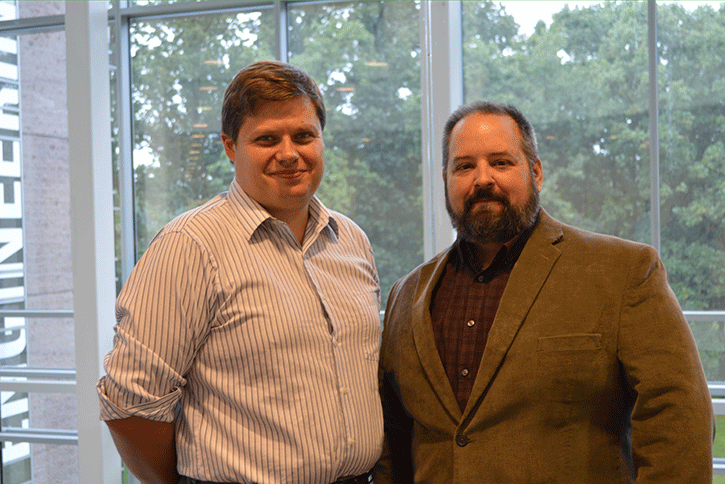
Jamie Wheeler, a master's student in the school's data analytics engineering program credits Assistant Professor Vadim Sokolov (left) for helping him understand the program better. Students in data analytics engineering can choose from a variety of concentrations and tailor this multidisciplinary program to meet their needs.
Wrangling data and making sense of the numbers intrigue Jamie Wheeler. He uses mathematical models to determine patterns in a host of problems—from what makes a serial killer efficient, to the best way to optimize a soccer lineup in real time, or if the lyrics of Prince’s song “Purple Rain” are positive or negative.
“I see myself as a translator,” says Wheeler, a master’s student in the Volgenau School’s data analytics engineering program. “We fail data and we fail people when we act like it is sorcery.” Wheeler likes to help people who don’t live in the math world—understand it.
Wheeler grew up in Manassas, Virginia, and graduated from Mason’s School of Business majoring in information systems and operations management with a minor in economics. He says his first data analytics engineering professor, Vadim Sokolov’s class made an enormous impact. Wheeler says the class gave him a better understanding of everything he does in the program.
Wheeler especially likes the multidisciplinary nature of the engineering school’s master’s program and says the nature of the work is so diverse that he must speak the language of data, engineering, economics, and business.
“When I explain what I’m doing to others, I try to find common ground and create context,” he says. “But the best thing about what I do is the cool tools. I’m more about the hammer than the house.”
Some of the tools include mathematical models and data visualization. He thinks visualization can really help people get a better understanding of problems because humans decode shapes faster than equations or words. “People look out the window and see a group of trees much faster than they would read the word, tree, tree, tree,” says Wheeler. Data visualization tools capitalize on this and helps scientists explain ideas.
When not studying or going to class, Wheeler is currently using some of those tools in his work with at Scottish renewable energy company. He is part of a project that is modeling the market and looking at the renewable energy consumption of the future.
“Right now we are gathering the data coming from a variety of sources power companies, economics, finance, the World Health Organization, and more. These are massive sets of heterogeneous data, and we’re using them predict a market that doesn’t even exist,” says Wheeler.
The work excites Wheeler enough that he is considering working on a PhD in operations research after he graduates. His teachers at Mason Engineering have inspired him to keep learning. “My professors have been some of the most brilliant and helpful people I have ever met,” he says.
By using a variety of mathematical models, Wheeler has discovered that Purple Rain may seem melancholy but it’s really neutral, soccer coaches can determine optimal rotation of players during games, and serial killers – well, that’s not something he’s ready to share.
